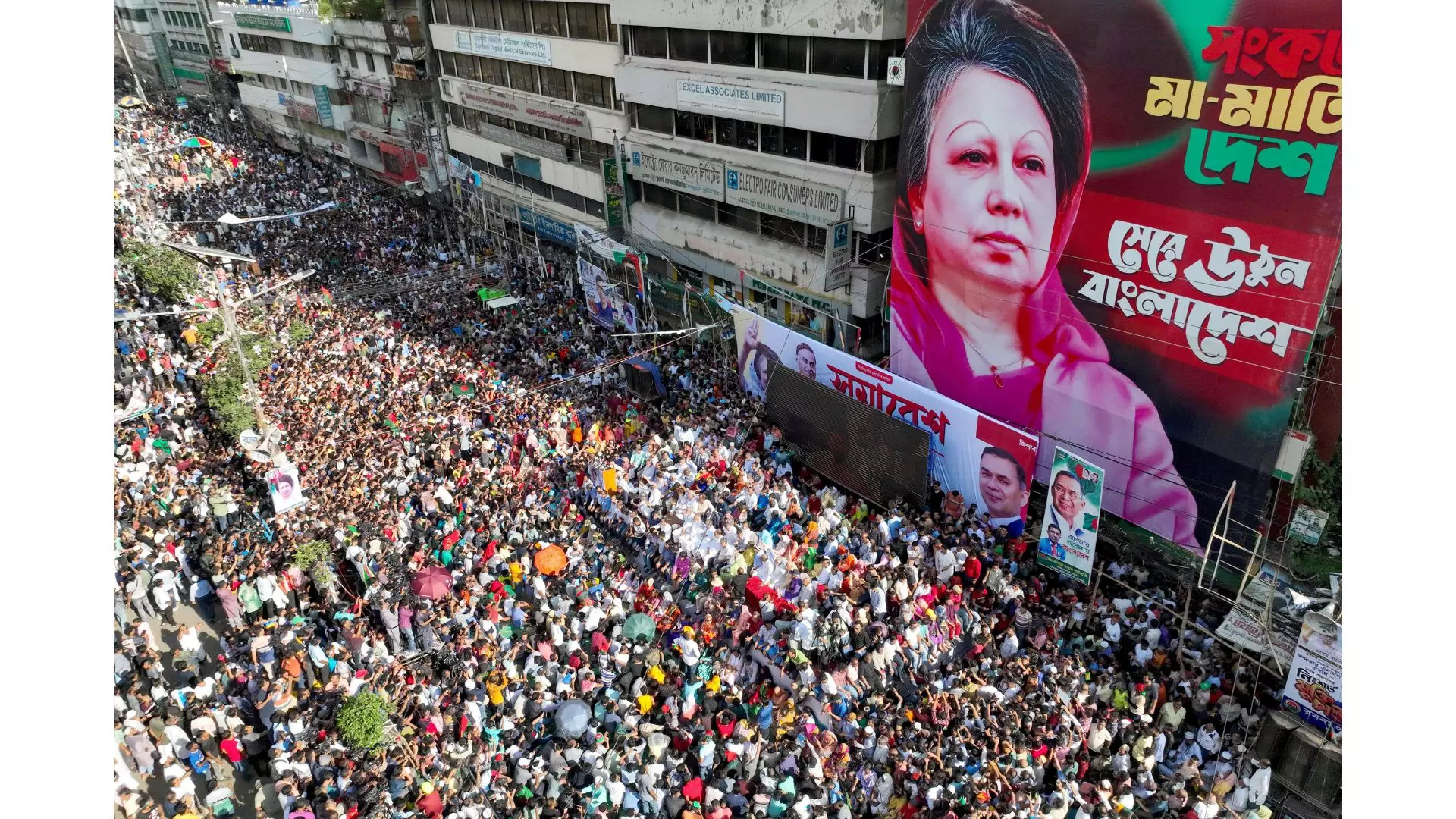Shashi Warrier | Of politics, lies and citizenly expectations
A discussion over drinks reveals differing views on Bangladesh's politics, historical parallels, and political dishonesty

I was watching the news on TV one evening when friends, a couple from Kochi, dropped in. “We’re on our way to the Mookambika temple at Kollur,” explained the husband, Balakrishnan, aka Bala. “We got stuck in traffic and we’re not going to make it before the temple closes tonight, so we thought we’d see you.”
“Good,” I said. “Eat here if you don’t mind driving at night.”
“Sure,” he said, “but I won’t drink because it’s another three hours from here.”
“You’re already tired,” said his wife, Kamini, “and you’ve driven most of the way here. So you relax and have a drink if you like, and I’ll drive from here on.”
“Why don’t you both relax?” I asked. “I’ll try to find you a driver who’ll take you the rest of the way.”
“A reliable one?” asked Kamini.
“Yes,” I said. “Let me see if he’s free.”
The driver was free and willing, so Bala and Kamini decided to relax. They’re both professors, widely travelled and well educated, and have differing opinions on politics. I like watching them argue, and regret that I have neither the wit nor the wisdom to join in.
The conversation inevitably turned to the disturbances in Bangladesh. “It’s basically an Islamist takeover with the Chinese and the Pakistanis backing it and the Americans hovering around doing God knows what,” said Kamini. “Non-Muslims are in trouble.”
“How can you say that?” asked Bala. “You know Sheikh Hasina’s been in charge for a decade and a half, and you know how autocratic she is, and you know how she might have subverted the election process. I don’t see another way that she could have stayed in power so long.”
The doorbell rang, and there was Murthy on the doorstep, bottle in hand. “I’ve got some time off,” he said, holding out the bottle. “I thought I’d spend some of it with you.”
“A couple is already here,” I said, leading him in. “Old friends from Kochi.” When I introduced them, none of them seemed to mind, and the three of them took their places around the table. “We were discussing the situation in Bangladesh,” I continued apologetically, because Murthy doesn’t talk about much other than domestic politics.
“I don’t know much about that,” said Murthy, pouring himself an extra large, “but I’m happy to listen.”
“Hasina might’ve rigged the elections,” Kamini said, returning hotly to the argument, “but rioting is as illlegitimate a way of toppling your government as a military coup. Besides, Yunus himself is likely a liar and a crook, because the first thing he did when he took over was to drop the corruption charges against himself.”
“Hasina’s government was a long way from a democracy,” said Bala, “and that’s what she promised during the elections. She lied... But we must consider nuance when we assess these matters.”
“What do you mean by nuance?” asked Kamini.
“Bangladesh isn’t all Islamists,” replied Bala. “Youngsters, mostly students, are angry about the jobs reserved for the offspring of freedom fighters. 1971 is ancient history for them. So it’s a choice between trying for a few government jobs or a lifetime in a sweatshop. And then there are the people whom Hasina threw into jail, or just disappeared. So the people the rebels are after are Hasina supporters, not Hindus or other minorities. And, of course, they do look at the harassment of Muslims in India as provocation.”
“Let me understand this,” said Kamini. “You’re saying that there are all kinds of people in Bangladesh, just like there are everywhere, so we shouldn’t judge them harshly.”
“Right,” said Bala.
“Let’s go back a little,” said Kamini. “Nazi Germany. There were all kinds of Germans there, right? People against Hitler, people who didn’t believe his Aryan nonsense, and so on, right?”
“Of course,” said Bala.
“So the point is this,” said Kamini. “At some stage, Hitler got confident enough to think he could take on the rest of Europe and went for Poland. That brought on World War II. At some stage, the atrocities in the then East Pakistan brought on the 1971 war. So what’s the tipping point at we think intervention is justified? A death toll? A refugee count? A treaty being abrogated? Public feeling? Fake evidence of weapons of mass destruction?”
Their voices were rising and Murthy decided to offer his two bits. “Just to let you know,” he said, “No one is a bad guy in his own narrative.”
“So what?” asked Kamini.
“So everyone lies,” said Murthy. “Look at WikiLeaks. We know now of the lies that went into the Iraq war. And those said by Pakistan and the US regarding 1971 war. Leaders lie. It’s a part of democracy.”
“What!?” asked Bala and Kamini in unison. “You must be kidding!”
“No,” said Murthy. “Think about it. Who’s going to vote for you if you promise little things, even if those things are the only things you can do? Look at the Kolkata rape case. It’s happening some years after the Nirbhaya case, after which all governments, state and Central, said they wouldn’t let such a thing happen again.
“Governments don’t mean much of what they say. Politicians make promises that they know they can’t deliver. Look at our present government. They promised to eliminate corruption but they shelter any corrupt Opposition politician willing to join them.
“You’re educated. You know all this. But would you vote for someone who promises to reduce rapes by two per cent a year? You wouldn’t.
“So the lies come because we expect and want those lies. Question is: Do politicians lie to us or do we make liars of them?”